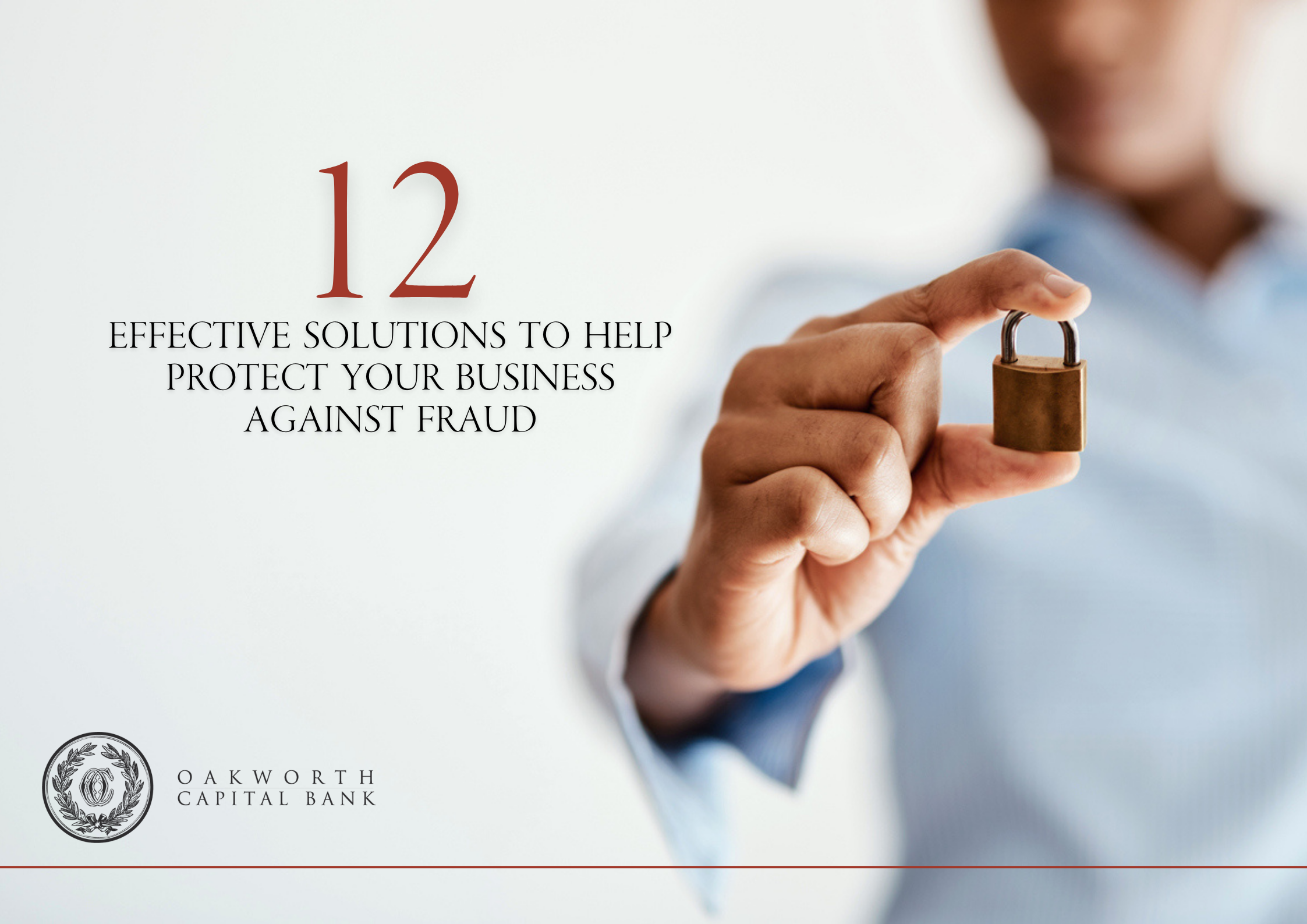According to the Association of Certified Fraud Examiners (ACFE), American businesses will lose an average of 5% of their gross revenue each year to fraud, causing a median loss of $117,000.
Smaller businesses are at an even higher risk than larger organizations. The biggest contributing factor? Lack of internal controls. Most smaller companies lack proper tools and training techniques to consistently prevent fraud from occurring.
As a business owner, there are things you can to do actively prevent fraud inside your organization. Here are 12 effective solutions:
Know all Payment Merchants and Beneficiaries
Be completely aware of what companies you are on debit with and who you are on credit with. If you receive notification that an account number or routing number has changed, immediately call your known payment beneficiary to confirm the change.
Embrace the “Human Element” in a Banking Relationship
First, consider the following important questions:
- Does your bank have an automated recording when you call?
- Is it difficult to get a human on the phone?
- Do you receive a call back immediately upon leaving a message?
While there are multiple benefits to having a personal relationship with your banker, one of the greater is that it can increase the ability to stop fraud. Having a direct point of contact enables you to quickly get in touch with your banker and their team if and when a fraudulent issue arises. Additionally, a banker who knows you personally should be familiar with your financial habits and transaction patterns. They may catch something and raise a red flag faster than even you can.
At Oakworth, we take pride in our client-centric services and make it a point to be available to our clients. If fraud is detected on a card, our operations team immediately closes the card and disputes the item, never once slowing down the process. In an effort to prevent wire fraud, our associates at Oakworth call the client to verify every time we receive an email requesting a wire.
Slow Down
Be wary of rushed requests. Most fraudsters want immediate payment and will always appear urgent or pushy in their requests. This is part of their act. The imposter wants to provoke you to take immediate action before you have time to think twice about the request or consult with others.
Monitor Your Online Account Regularly
Keep an eye on your account activity on a regular basis – daily if possible. This can help allow you to spot any suspicious or unauthorized transactions immediately. The sooner you identify such activity, the quicker you can take action to prevent further damage. Make it part of your morning routine! In much the same way that you check your email each morning, check your online account, too. It only takes a few minutes.
Set up Alerts on Your Account
Through Oakworth’s Online Banking system, you can set up alerts to notify you when there’s unusual activity in your account.
Alerts can be set for Account Activity, including notification of transactions over a certain amount, notification if balance drops below a certain amount, notification if an account is overdrawn and more.
Alerts can also be set for Security Activity, including notification anytime an online transfer is processed, notification when a debit card status changes, notification when any new external transfer account request is submitted, or when any sort of security-related change is made on the account.
Set Up Dual Control Procedures
Dual controls split the duties of initiating and approving ACH and wire payment into two steps (and two people): People who initiate and people who approve them. A form of checks and balances; this prevents a single person from having full control of payment initiation and approval. Oakworth requires this for all wire transfers in order to reduce the risk of fraud, errors, and unauthorized activities.
Know Exactly Where Your Money is Going
It’s important to validate all information found on any invoice by confirming the routing number and name on the account.
Verify over the phone, verbally with a person you know by name from the other institution with whom you are doing business, and especially if something on the account has changed. No matter how long you have been doing business with someone, it’s important to never get comfortable with routine.
Utilize your Online Banking System
Online banking allows you to have easy access to your accounts and easily view any activities on your accounts. Online Banking is not only safe and secure but it’s also convenient (access from anywhere), saves time, and is accessibly 24 hours a day, 7 days a week. It allows for real-time account monitoring and can help simplify your business’s financial picture. Oakworth is constantly keeping our clients updated on new features and we hope you’ll take advantage of the full benefits.
Set up Positive Pay
Is your company still using paper checks? Positive pay can provide protection against fraud associated with paper checks and ACH debit transactions. It puts you in control to block any non-authorized transactions from posting to your account. Positive pay provides a clear record of checks that have been issued and paid, making it easier to match records and identi0fy any discrepancies. Setting up positive pay can help you focus on core operations without constant worry over the potential for financial losses due to fraud. Learn more about positive pay here (link to positive pay article).
Download SecurLOCK
SecureLock is an easy-to-use mobile app that puts the power to protect your debit cards in your hands. Simply use the app to turn your card on or off in real time as needed. You can also set spending limits, block transactions based on locations, receive transaction notifications and more. Going out of the country? Set the card to only work where you are. Want to know if someone else is using your card? Receive instant alerts anytime the card is used.
Set Up an ACH Debit Block
ACH payments are made as a digital version of traditional paper checks. An ACH block is a fraud management tool that allows you to keep funds safe and avoid unwanted transactions. It allows you to specify who, if anyone, is able to pull money out of it. If you aren’t on the authorized list, your payment will get blocked.
Set up a Fraud Awareness Training for Company Employees
Awareness and training are key to protecting your business against fraud. See our article on How to Prevent a Strong Fraud Prevention Policy. Employees should be able to recognize when something isn’t right. Fraud is overwhelming! There is a tremendous opportunity to harness the collective power of the workforce by increasing awareness and training employees to be better, more confident fraud detectors.
It’s important to remember that there is no one-size-fits all solution when it comes to fraud prevention. Implementing one or more of these techniques should be part of a broader cybersecurity and fraud prevention strategy that includes multiple security measures.
Note: This article is part of a special content series on Corporate Fraud Prevention. Also check out:
WATCH OUR RECORDED WEBINAR:
American businesses will lose an average of 5% of their gross revenues to fraud. The biggest contributing factor? Not having the right internal, standardized procedures in place in order to prevent fraud from occurring. Our Oakworth Treasury Management team gives a detailed discussion so you can better protect your business on the front end.

Featuring the following discussions:
What is Corporate Fraud? | Amelia Ricks CTP
Treasury Management Advisor, Central Alabama Market
Who are Fraudsters? What are Attacks? | Tyler Fruland
Treasury Management Specialist, Middle Tennessee Market
Corporate Fraud Solutions | Jaye B. Patterson
Treasury Management Specialist, South Alabama Market
This information is being provided for informational and educational purposes and is not meant to be taken as specific advice. All decisions regarding the legal implications of these strategies should be discussed with your advisors before being implemented.



